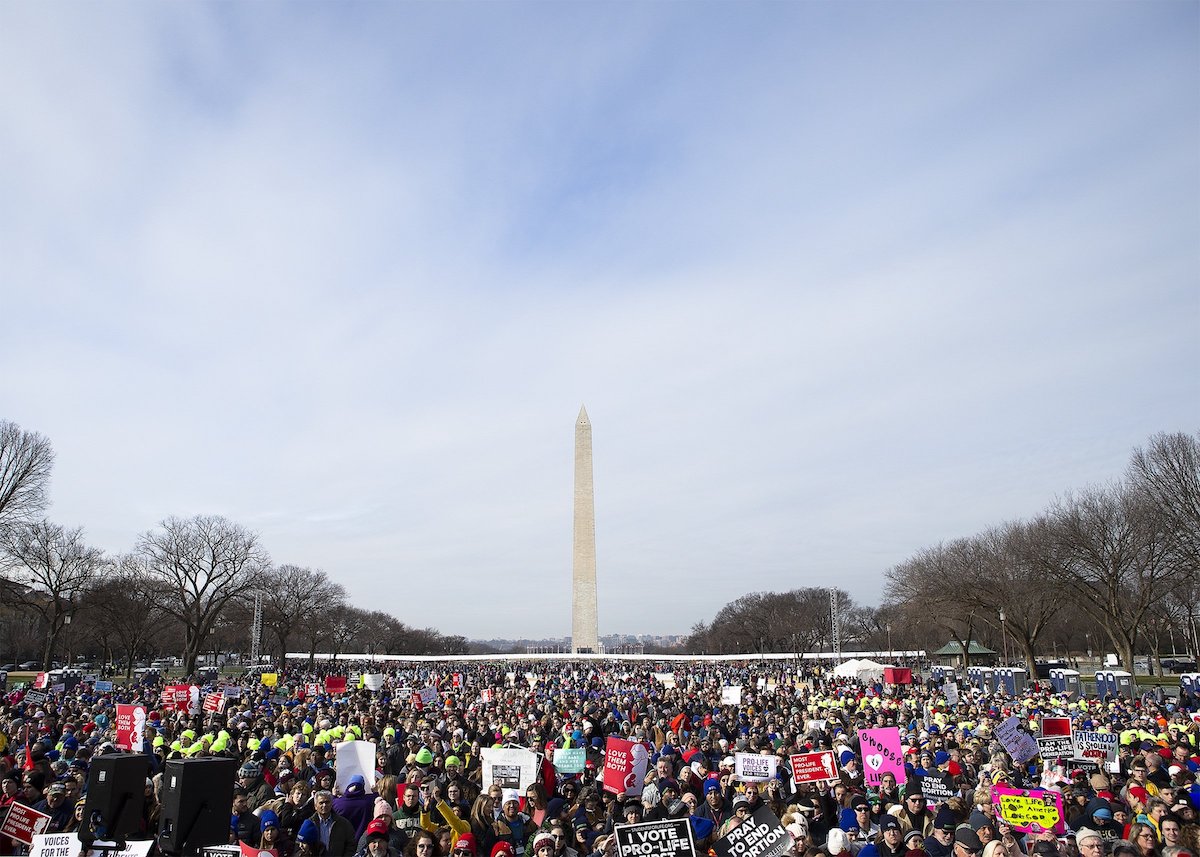By Mark Pattison, Catholic News Service
WASHINGTON (CNS) — How to make sense of Americans’ attitudes toward abortion? It isn’t easy.
In polls, many respondents will give answers that contradict each other.
A Gallup poll in 2019 — Gallup has polled regularly on abortion since 1975 — found that 92% of Americans believed that using birth control was “morally acceptable,” but their support for abortion, by contrast, was more mixed. (The Catholic Church teaches that both are morally wrong.)
But the year before, Gallup found that 65% of Americans believed abortion should generally be illegal during the second trimester of pregnancy — but in the same survey, 69% said the Supreme Court should not overturn Roe v. Wade.
FiveThirtyEight, which itself analyzed abortion polls, “found that a large majority of Americans support abortion in the first trimester, but that support tends to drop in the second trimester.”
In an ABC News-Washington Post poll conducted in late April, 54% of Americans want the court to uphold Roe, nearly twice as many as the 28% who want to see it struck down. Also, an ABC poll offering only a yes-or-no choice found that 57% of Americans opposed a ban on abortion after 15 weeks of pregnancy, while 58% opposed a ban after six weeks.
If abortion weighs on the mind of pregnant women, talking about it seems to be just as difficult for all Americans.
Hannah Hartig, a research associate on the U.S. politics team for the Pew Research Center, calls it “cross pressure.”
Pew has been polling regularly about abortion since 1995. Pew has found that whether certain statements about abortion used in its polling also describe the respondent’s views as well, they’ve been offered the same seeming contradictions.
“Thirty-three percent of adults say human life begins at conception, and so a fetus is a person with rights,” Hartig told Catholic News Service in a May 16 phone interview, yet they also hold that the decision on whether to have an abortion belongs to the woman.
“So on one hand you can look at them at think they they’re contradictory,” she said, but it isn’t necessarily the case because of this cross pressure.
Results of Pew’s latest polling on abortion, issued May 6, show a starker partisan divide than had existed in the past.
Since 2007, Republicans who say abortion should be legal in all or most cases went up from 37% to 39%. Among Democrats, the percentages went up from 63% in 2007 to 80% in 2022. In 2012, the percentages of Americans either for or against abortion came together the closest they’d been, but support for legal abortion has never fallen below 50%.
Younger Republicans, including 47% of those ages 18-29, said abortion should be legal in most or all cases. Among all Americans, though, the older the respondent, the less likely they are to agree with that view — although majorities supporting a right to abortion extends through the oldest age group.
And through it all, Gallup has found that support for legal abortion, after nearly 50 years of polling, has gone up all of 1%, and opposition is down by the same 1%.
Hartig told CNS a “halo effect” can apply to phone polling, as the respondent may offer answers that he or she thinks the pollster wants to hear. “Online polls,” she said, “typically show less (of a) social desirability bias,” another way of saying halo effect. She said the May Pew poll was conducted online via its American Trends panel.
Regardless of how the poll is conducted, Hartig said Pew doesn’t want to inundate respondents with questions about abortion, “which we know is a very personal, sensitive topic for many Americans. Intimate — yes, that would be a factor.”
“Whenever the Pew Research Center is tracking a sort of trend, we always at minimum want to place it in context to a question we’ve asked before” on the topic, she said. “We also want to keep it away from certain political topics. We want to give people a clean read about it. We also want to avoid questions about the Supreme Court.”
Hartig said, “When we’re designing these, we want to be very careful about the questions that we ask.” Pew gives them a chance to offer additional thoughts on abortion. “I would say about a third of respondents chose to answer these open-ended questions,” she added. “It is a fair number who ended up skipping” the opportunity to flesh out their thoughts.
Hartig said Pew does not spin the results. “The motivation for this study is research,” she declared. “We always hope the Pew Research Center, in conducting these large studies, is that it’s a straightforward contribution to the public dialogue. We want people to look at the data and digest it for themselves. We take great pains to make sure our questions are fair and reasonable.”
Moreover, while some polls will include questions paid to be asked by some company or interest group, such is not the case with Pew. “We are independent, nonadvocacy, nonprofit — all the ‘nons’ you can think of,” Hartig said.
Although abortion consistently ranks lower than the economy, health care and many other issues in surveys of Americans, abortion questions will continue to be asked by pollsters.
“We don’t know how that will change” once the Supreme Court rules in the Dobbs vs. Jackson Women’s Health Organization case involving Mississippi’s 15-week ban on abortion, Hartig noted. “States start enacting more restrictive laws, or less restrictive laws — if states are allowed to make those decisions.”
She added, “Anytime you have a high-profile case, you are as interested in stability as you are in the change. That’s the case for a number of different topics, not just abortion.”







